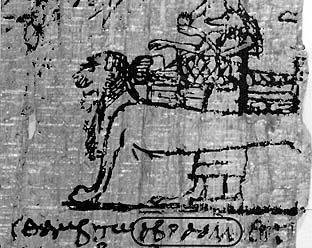
FAIR is a non-profit organization dedicated to providing well-documented answers to criticisms of the doctrine, practice, and history of The Church of Jesus Christ of Latter-day Saints.
(m) |
No edit summary |
||
| Line 35: | Line 35: | ||
</blockquote> | </blockquote> | ||
</onlyinclude> | |||
== == | == == | ||
{{endnotes label}} | {{endnotes label}} | ||
<references/> | <references/> | ||
{{Articles Footer 1}} | {{Articles Footer 1}} | ||
It is claimed that Abraham would never be associated with the Egyptian "lion couch" scene, and that the scene would never be used to represent a sacrifice.
Another "lion couch" scene has been discovered which actually includes Abraham's name. Note that it does not claim that Abraham is the figure on the lion couch, and notes that "[t]he figure on the lion couch in this papyrus is a woman." [1]

Also of interest is some correlation between The Book of Abraham and the Apocalypse of Abraham, a Jewish document composed between about 70–150 AD. The Apocalypse of Abraham describes the idolatry of Abraham's father in detail, and talks of how Abraham came to disbelieve in his father's gods. The following quotes describe how God told Abraham to leave his father's house so that he would not be destroyed.
15 And as they lifted up their hands upon me, that they might offer me up and take away my life, behold, I lifted up my voice unto the Lord my God, and the Lord hearkened and heard, and he filled me with the vision of the Almighty, and the angel of his presence stood by me, and immediately unloosed my bands;
16 And his voice was unto me: Abraham, Abraham, behold, my name is Jehovah, and I have heard thee, and have come down to deliver thee, and to take thee away from thy father’s house, and from all thy kinsfolk, into a strange land which thou knowest not of;
17 And this because they have turned their hearts away from me, to worship the god of Elkenah, and the god of Libnah, and the god of Mahmackrah, and the god of Korash, and the god of Pharaoh, king of Egypt; therefore I have come down to visit them, and to destroy him who hath lifted up his hand against thee, Abraham, my son, to take away thy life.
VIII. And it came to pass while I spake thus to my father Terah in the court of my house, there cometh down the voice of a Mighty One from heaven in a fiery cloud-burst, saying and crying: “Abraham, Abraham!” And I said: “Here am I.” And He said: “Thou art seeking in the understanding of thine heart the God of Gods and the Creator; I am He: Go out from thy father Terah, and get thee out from the house, that thou also be not slain in the sins of thy father’s house.” And I went out. And it came to pass when I went out, that before I succeeded in getting out in front of the door of the court, there came a sound of a [great] thunder and burnt him and his house, and everything whatsoever in his house, down to the ground, forty cubits.

FAIR is a non-profit organization dedicated to providing well-documented answers to criticisms of the doctrine, practice, and history of The Church of Jesus Christ of Latter-day Saints.
We are a volunteer organization. We invite you to give back.
Donate Now